Key takeaways:
- Reparations represent not only compensation for historical injustices but also recognition of human dignity and potential for societal transformation.
- Different forms of reparations, including financial payments, educational initiatives, and community investments, can work together to address systemic inequalities.
- Personal experiences with reparations highlight their role in fostering financial literacy, economic empowerment, and reshaping narratives within marginalized communities.
- The future of reparations could drive policy changes towards equity, creating opportunities for entrepreneurship and a resilient culture in affected communities.

Understanding reparations politics
Reparations politics encompasses the debate surrounding compensation for historical injustices, particularly in relation to slavery and systemic discrimination. When I first began to really delve into this topic, I was struck by how deeply personal it felt; the conversations about reparations evoke emotions not just of anger or sorrow, but also hope for justice.
In my experience, understanding reparations requires grappling with the lasting impact of those injustices on communities today. I often ask myself, what does true equity look like, and how can reparations be a step towards it? Reflecting on stories from friends and family who have faced systemic barriers, I realize that reparations are not just about financial restitution; they represent a recognition of human dignity.
As I engage further with this topic, I find it crucial to consider the different forms reparations may take, such as monetary compensation, educational initiatives, or community investments. It’s fascinating to think about how these measures could transform lives. How could such changes reshape our society? I believe they hold the potential to foster deeper understanding and heal generational wounds.
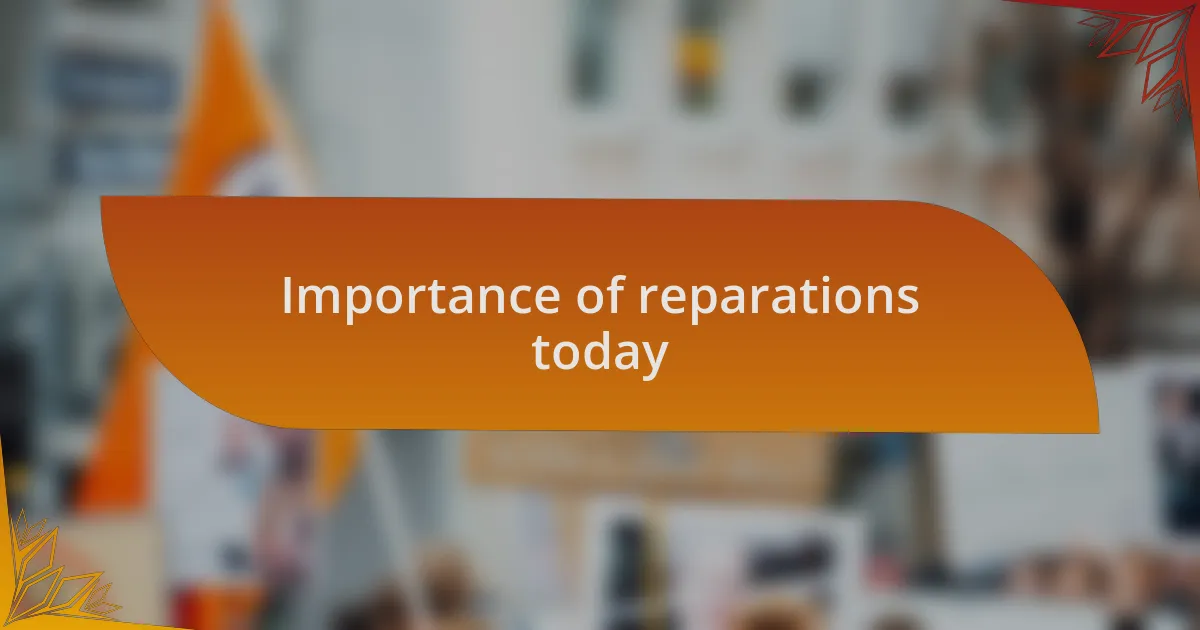
Importance of reparations today
Reparations today hold immense importance as they challenge established narratives of history and acknowledge the wrongs endured by marginalized communities. I remember attending a discussion panel where a speaker passionately described how reparations could not only address financial disparities but also mend the societal fabric torn by decades of injustice. Hearing their perspective made me reflect deeply on how acknowledgment can pave the way for genuine healing.
When I think about the conversations surrounding reparations, I often consider the potential for education to transform lives. For instance, imagine funding for schools in underserved areas; it brings the possibility of better resources and opportunities for future generations. Isn’t it powerful to envision a world where every child has equal access to quality education, thereby breaking the cycle of poverty and disenfranchisement?
Moreover, the very act of discussing reparations today ignites a sense of accountability among those in power. It compels us to confront uncomfortable truths about our society’s history. Personally, I’ve found that grappling with these truths can be unsettling, but it also encourages social responsibility and prompts individuals to become advocates for change. How can we expect progress without first confronting the past? The road to reconciliation begins with recognizing our collective history, and reparations are a necessary step on that journey.
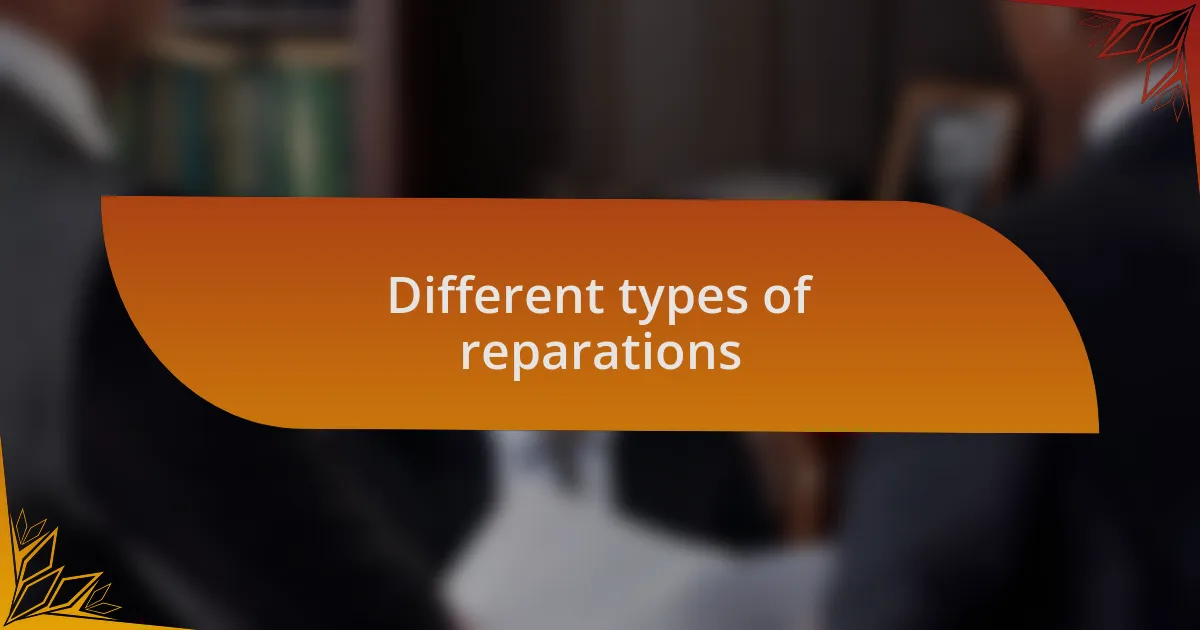
Different types of reparations
Different types of reparations can include financial payments directly to individuals or communities, educational scholarships, and investments in community infrastructure. I recall a conversation with a friend who expressed skepticism about cash payments. She argued it wouldn’t create long-term change, and I found myself questioning whether cash alone is enough to address systemic issues. The truth is that different types of reparations can work in tandem to create a more equitable society.
Additionally, community-based reparations involve initiatives like funding local businesses or improving healthcare access. When I learned about a community’s effort to support small business owners of color, it struck a chord with me. These initiatives often foster economic empowerment, allowing individuals to build wealth and stability in ways that direct payments alone might not achieve. Isn’t it fascinating how investing in community can create a ripple effect of positive change?
Then there are symbolic reparations, which might include public apologies or memorials acknowledging past injustices. I attended a ceremony where local leaders recognized the historical wrongs faced by a marginalized group, and it was moving to see how such gestures can validate experiences that have long been ignored. Isn’t it remarkable how recognition alone can spark healing and reconciliation, paving the way for a more just future?
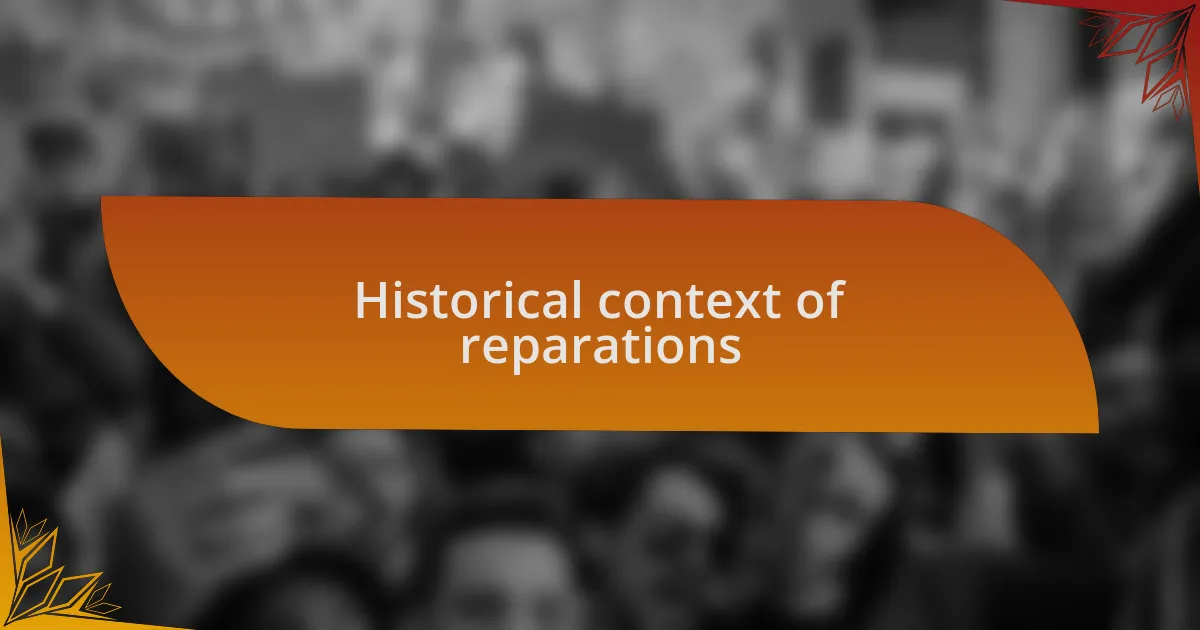
Historical context of reparations
Reparations have a complex history that traces back centuries. Initially, they emerged in the wake of wars, with victors demanding compensation from the defeated. I often think about how this concept evolved; it was intended to restore balance, but for many marginalized communities, it has become a quest for justice that feels elusive and fraught with challenges.
The discourse around reparations gained momentum especially after the abolition of slavery in the United States. I remember reading about how some former slaves were promised land and resources—promises largely unfulfilled. This unmet expectation has left a lasting legacy of mistrust and continues to fuel discussions about what true reparative justice should look like.
Throughout history, various groups, such as Jewish communities post-Holocaust and Native Americans, have sought reparations as a means of acknowledging past atrocities. When I reflect on these movements, I’m inspired by their perseverance, but I can’t help but wonder: how has this struggle changed our collective understanding of justice? It’s a question that lingers, pushing us to reconsider what we value in our society.
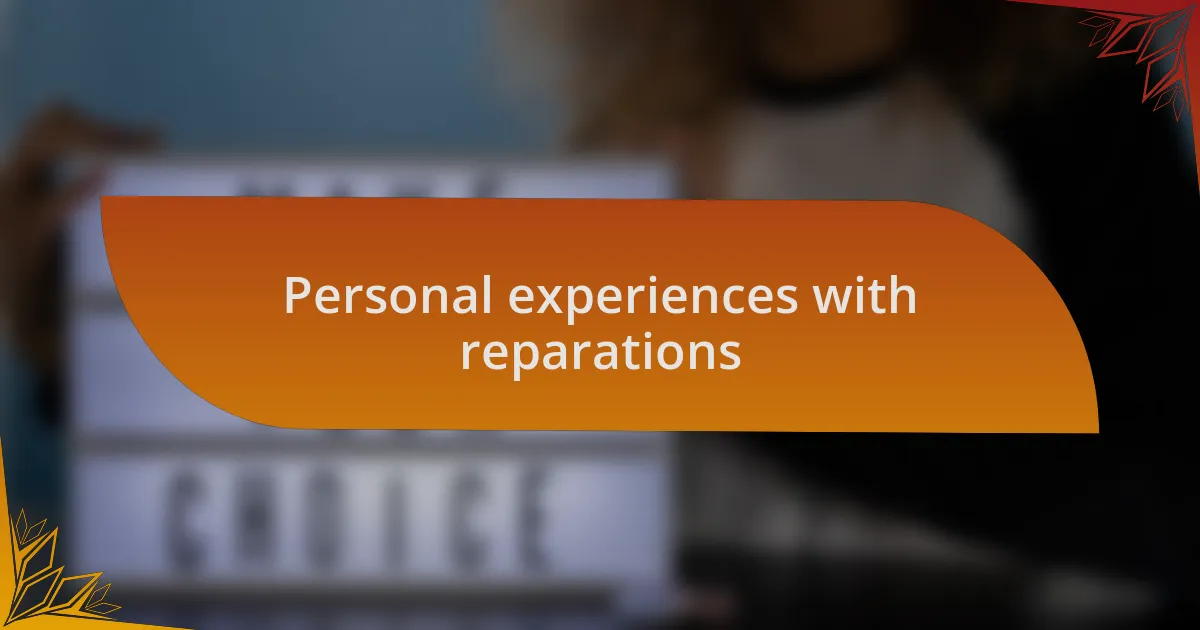
Personal experiences with reparations
When I first encountered discussions around reparations, it was during a community forum where members shared their stories. Hearing firsthand accounts stirred something deep within me; the pain and resilience in those voices painted a vivid picture of how past injustices continue to shape financial realities today. It made me reflect: can monetary compensation ever truly heal historical wounds?
Through my own lineage, I’ve felt the echoes of my ancestors’ struggles. Learning about the lack of access to wealth-building opportunities for my family left me with a mix of anger and determination. As I navigated my own financial journey, I realized that understanding these systemic barriers helped me frame my own goals more clearly; I wanted to create a legacy that defied those constraints.
One poignant moment stands out: when I received notice about a local reparations initiative aimed at providing scholarships to descendants of enslaved people. The elation I felt was palpable; it wasn’t just about the financial aid. It symbolized recognition of our shared history and a commitment to fostering new opportunities. In that instant, I understood that reparations could transform not only my financial outlook but also the narrative of my community.
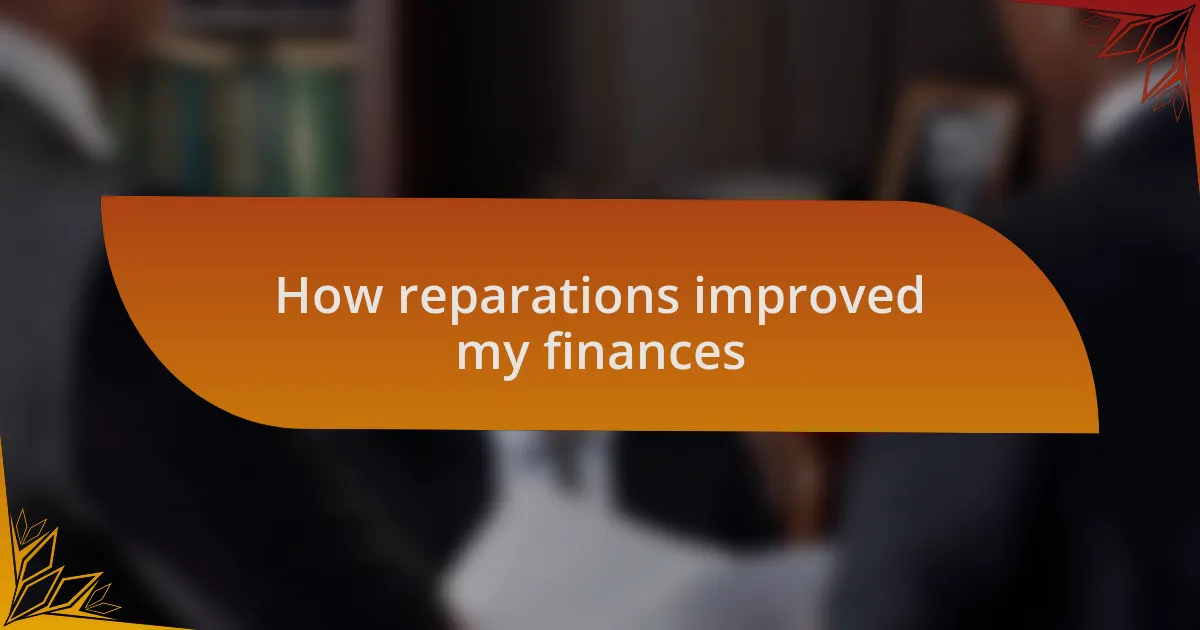
How reparations improved my finances
Receiving reparations profoundly shifted my financial perspective. One moment that stands out for me was when I was awarded a grant through the reparations program for small business owners in my community. I can still recall the exhilaration that washed over me; it wasn’t just about the funds but the validation of my entrepreneurial dreams that had been stifled for too long.
With that financial boost, I was able to invest in my business and create more sustainable income streams for my family. I remember sitting down with my accountant, realizing that the capital I received allowed me to not only elevate my venture but also hire local talent. How often do we see opportunities like this emerge from recognition of past injustices? It’s empowering to know that reparations can foster economic growth while uplifting those who have historically been marginalized.
Moreover, receiving these funds sparked meaningful conversations within my family about financial literacy. We began discussing investments and savings strategies, topics often brushed aside in our household. This revelation illuminated a path toward long-term financial stability—something many in my community have been deprived of. I began to wonder, how can this ripple effect of reparations inspire future generations to break free from cycles of economic disadvantage?
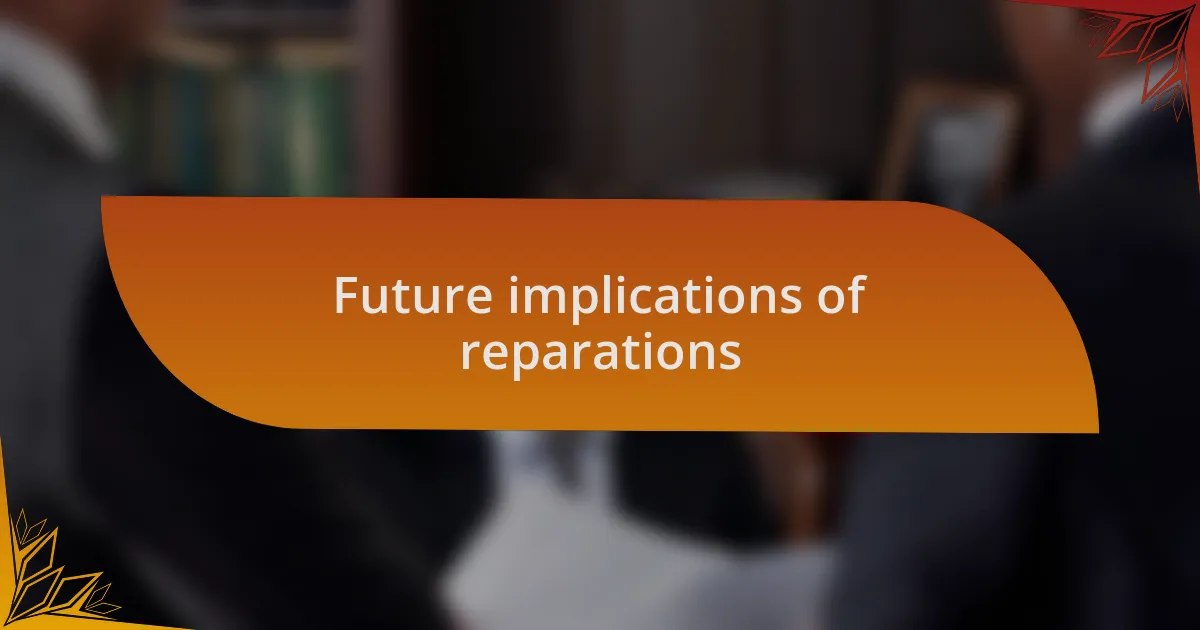
Future implications of reparations
The future implications of reparations are vast and multifaceted. I often think about how the financial empowerment I experienced could create a new narrative for subsequent generations. Imagine a community where individuals have the tools and resources to innovate and thrive—what would that look like? I can only hope it leads to a stronger foundation of wealth-building and entrepreneurship.
As I engage with my peers, it’s clear that reparations can also drive policy changes toward equity and inclusion. For instance, I’ve seen local governments start fostering initiatives that support minority-owned businesses as a direct response to the reparative movements. This type of systemic transformation remains crucial; it’s not just about receiving funds but also reshaping societal structures to level the playing field.
Reflecting on my experiences, I wonder how approaches to education might evolve in response to reparations. I envision programs that educate future business owners not only in financial management but also in navigating systemic barriers. If these educational initiatives take root, perhaps they can establish a culture of empowerment that extends well beyond economics, fostering resilience and aspiration.